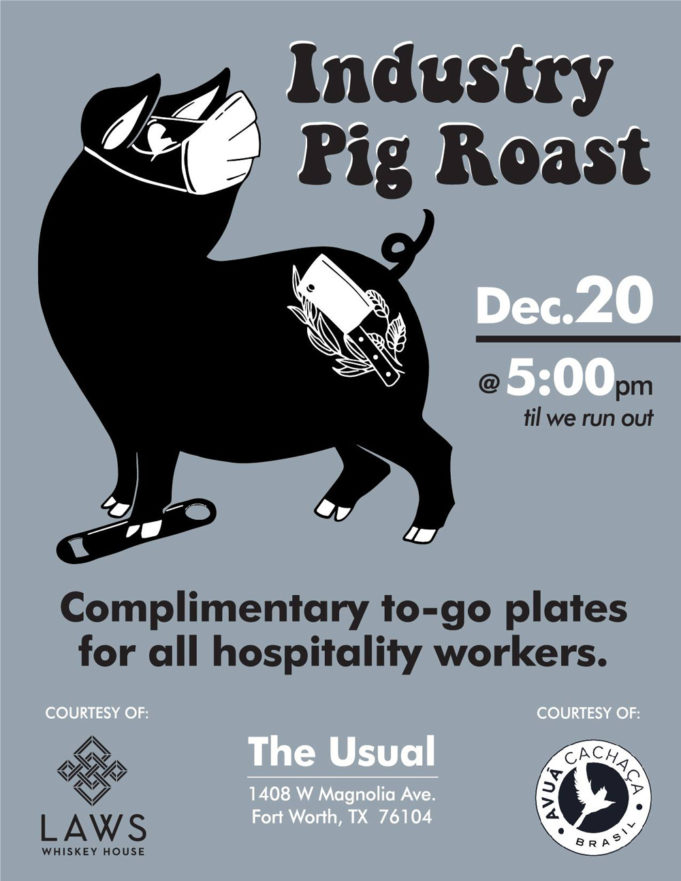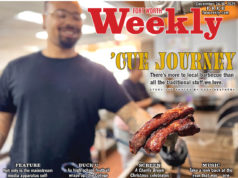Like many things in 2020, restaurants and bars are becoming political (in a nonpartisan manner). Faced with a Payment Protection Program (PPP) that allotted around 5% of forgivable loans to restaurants and bars at a time when the hospitality industry was being forced to temporarily close, many hospitality owners who oversee a workforce of 15 million are barely able to pay rent and overhead.
In April, Fort Worth native Nathan Whitehouse founded THIRST, a nonprofit that helps small hospitality businesses advocate for themselves at all levels of government. THIRST, which now supports hospitality workers in 20 states, is launching a public awareness campaign dubbed Protect the Pour on Sunday. Hospitality workers are invited to take a grab-and-go bowl of smoked pork (or a vegetarian alternative) starting at 5 p.m. at The Usual (1408 W. Magnolia Ave., 817-810-0114).
One aim of Protect the Pour is to address food insecurity among hospitality workers. Waiters and bartenders subsist off tips, Whitehouse said, meaning that the ongoing slowdown of in-person dining has left waitstaff with as little as $2.13 an hour (the minimum allowed for tipped employees in Texas). Well-intentioned as it may have been, the PPP initially required that federal funds be spent within eight weeks, meaning that many bars and restaurants across the country were left with no choice but to hire back workers during mandated shutdowns or risk having to repay the loans in full. Those economic stressors and other factors have led to the permanent shuttering of more than 100,000 U.S. restaurants and bars, according to CNBC.
Aaron Lamprecht-Morphew, who works for Colorado-based distillery Laws Whiskey House, said March brought the usually bustling lives of waiters and bartenders to a “screeching halt.” Lamprecht-Morphew joined the board of THIRST to support an industry that was in uncharted waters, he said.
THIRST is pursuing several avenues to support and save U.S. bars and restaurants. Political advocacy is a top priority, Whitehouse said. THIRST and other hospitality advocacy groups are calling for U.S. Congress to pass the Real Economic Support That Acknowledges Unique Restaurant Assistance Needed to Survive (RESTAURANTS) Act. If passed, the act would direct $120 billion to foodservice and drinking establishments that are not part of a large chain or are publicly traded.
Whitehouse, who is a lawyer by training, said many restaurants and bars missed out on PPP loans because those establishments did not have a team of lawyers that knew how to file the necessary federal paperwork quickly. Several THIRST volunteers recently sought and gained low-level government positions (city aldermen, who represent neighborhoods and districts, and commission appointees) across the country. Placing restaurant and bar advocates in positions of power ensures that small businesses in the hospitality sector have a voice in local politics, Whitehouse said.
Many food and beverage business owners said they were denied benefits from business interruption insurance, even when the proprietors were entitled to those insurance payouts, Whitehouse added. THIRST members work to educate hospitality workers on their rights to those and other payouts.
“Tax abatements are always helpful,” Whitehouse said. “One of the big issues [these small business owners are confronted with] is paying rent while facing a super-reduced revenue rate.”
Sunday’s event is the first step in what will be a national effort to raise awareness of the importance of saving non-chain restaurants and bars. Besides being an integral part of any community, Whitehouse said, the gathering spaces serve a critical societal role.
“Bars and restaurants are embedded in their communities,” he said. “Where you learn to be civil with people who disagree with you is around the table. All of us enjoy food and drinks. … Bars and restaurants have always been that place where community is built. That is something that heals people’s experiences in life. I find this to be something super-important to support.”
Donations to THIRST can be made via ThirstGroup.org.












